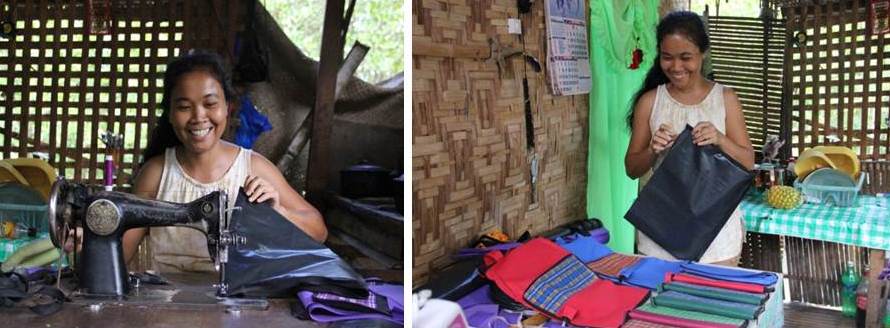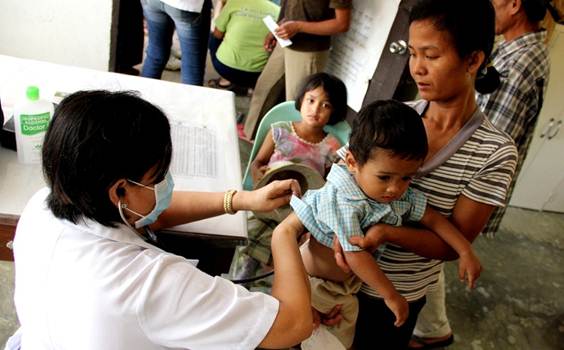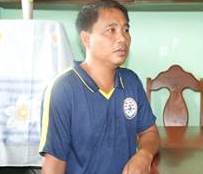Josie’s Bags … her family’s ticket to a better life

Jocelyn Saldivar Tutor or Josie, 37, from Barangay Anibong, Ayungon, Negros Oriental, is a Pantawid Pamilyang Pilipino Program grantee since 2008. Josie is a loving wife and a mother of three boys – Ian Lester, 11, Jay, 8, and Ian Rey, 6.
After marrying Jerry, whom she met in a factory where she worked, the newlyweds started their family in Jerry’s hometown of Negros Oriental.
In a province where planting and harvesting sugar cane is handed down from one generation to another, Josie thought that she will not survive because she knew nothing about the sugar industry. She instead used her sewing skills to help her husband, a sugar cane worker, make ends meet.
As a beneficiary of Pantawid Pamilya, they are now able to provide for their children’s educational and health needs through the P1,400 cash grants that they are receiving and from the income she derives from her flourishing bag business. Diligently, she complies with the program conditionalities of monthly visit to the health center and 85% attendance of her kids in school.
Josie said that through Pantawid Pamilya, she learned the importance of community participation, improved parental values, and time management through attendance to regular Family Development Sessions (FDS), a gathering of beneficiaries where they are taught responsible parenthood.
How Josie’s bags came to be
Aside from the blessings of the cash grant and the value formation through the FDS, another opportunity came Josie’s way in 2011. Her family was provided with access to livelihood assistance through DSWD’s Sustainable Livelihood Program (SLP) – Self-Employment Assistance Kaunlaran (SEA-K) component which provides a no-interest loan payable in two years.
SLP is a community-based program which provides capacity-building to improve the beneficiaries’ socio-economic status. It supports microenterprises through the SEA-K program to become organizationally and economically viable. It also links participants to employment opportunities through Public-Private Partnership.
Having listened to the SEA-K orientation, Josie made a life changing decision for her family when she availed of the SEA-K Program.
Now, a member of the Mutya SEA-Kaunlaran Association in Barangay Anibong, Josie was granted the seed capital of Php5,000.00, which she invested in her small sewing business, venturing not just into dressmaking but into making bags of all sizes. Keeping the SEA-K training in mind, 30% of her income goes to her family’s savings while 70% goes to her business.
“Tanan inahan nagkinahanglan ug bag nga lig-on apan kinahanglan dili pud mahal” (All mothers need a bag, but it should not be expensive),” said Josie. This idea compelled her to make bags of all sizes, with prices ranging from P25-125 only.
With the assistance of her husband, Josie ventured into sewing back packs and sling bags. In just a short period of time, Josie was able to purchase an additional sewing machine.
When the 6.9 magnitude earthquake hit the province on February 6, 2012, Josie’s house was damaged and she also lost almost P9,000 worth of capital. But she remained strongly hopeful to bounce back. True enough, she wasted no time in sewing more bags because orders started coming in, other than that her quality bag products became a household name in their locality.
The Community Driven Development Enterprise conducted by DSWD Field Office VII provided another opportunity for Josie to showcase her prowess through her products, where she received voluminous orders from both new and old clients. Consequently, in September 2012, she earned a hefty Php22,000 from the sale of her bags.
Josie’s bags have gone a long way. DSWD Field Office VII is proud to be a client of her sturdy “document bag,” which in turn, got the interest of other partner agencies.
Balance between family life and business
The Tutor family is still far from being rich, but slowly, Josie and her husband work together in improving their lives and making a difference in their community. While attending to her bag business, Josie still makes it a point to attend to the needs of her children not forgetting to comply with the conditionalities of the Pantawid Pamilya and her regular attendance to FDS. Further, having imbibed the DSWD values of hard work, perseverance, and the “pay it forward” ideals, Josie extended her livelihood skills to her in-laws.
“Mas maayo man nga makahibalo sila ug laing pama-agi sa panginabuhi ing kaso ug bati ang ani sa tubo, di sila magutom ug ang ilang mga anak agpadayon sa pa-ayong panginabuhi” (It is better that they learn other means of livelihood in case sugar cane harvest is not good. With other livelihood opportunities, they will not go hungry and their children can continue to have a better future).
The once shy Jocelyn now takes part in community activities while she continues to sew for her family’s dream house and her children’s future. ###
Pantawid Pamilya inspires young mother of six to dream for her kids
Every morning, Sarrah prepares a glass of milk for her six children. She gives each one of them a sip from the glass hoping that it would be enough to keep them go through the day until the next glass can be prepared.
This is how 26-year-old housewife, Sarrah Jane Mapacpac, of Brgy. Ibabang Iyam in Lucena City, describes their life before they became a beneficiary of the Pantawid Pamilyang Pilipino Program . Her husband buys and sells scraps which does not earn him enough money for a family of eight.
Sarrah’s family is one of the 169,687 (as of December 26) household-beneficiaries of the Pantawid Pamilya in the CALABARZON Region. Since 2010, her family has been receiving P1,400 cash grants under the program for her children’s health, nutrition, and education needs.
Pantawid Pamilya is a human development program and social protection strategy of the national government that provides cash grants to poor families as long as they comply to the conditionalities of sending their children to school and to health center for check-ups. As of January 18, more than 3.1 million households are registered in the program and already receiving cash grants.
“Noon, hirap na hirap kami sa pagbibigay ng baon sa mga bata. Pati rin ang mga bayarin at school projects di namin matugunan kung kaya’t binabalewala ko ang mga pa-meeting sa school, (Before, it was hard to give the children money for school. We don’t even have money to pay for the school contributions and projects. These are often the reasons why I am reluctant to attend parent meetings in school),” she shared.
Sarrah makes sure every centavo of the cash grants from Pantawid Pamilya goes to her children. She does not worry anymore about her children’s school needs, especially when it comes to paying the dues. As a result, she became an active parent in school and her children became very enthusiastic about going to class. Sarrah’s children became inspired and responsible when it comes to education as no one wants to be absent anymore.

“Dati, hindi ko rin pinapapacheckup ang mga anak ko kasi wala kaming pambili ng gamot, (Before, I don’t bring my children to the health center because we cannot afford to buy medicines),” Sarrah admitted. She feared going to the health center because it would mean additional expenses, which she knew their current income is not enough.
“Ngayon na naging benepisyaryo kami ng Pantawid Pamilya, nagkaroon ako ng lakas ng loob na pumunta sa center at natutukan ko ang pagpapacheckup sa mga bata. Ngayon, kahit walang sakit, dinadala ko na sila sa health center, (Now that we are beneficiaries of Pantawid, my views about going to the health center changed. I make sure that my children are checked up regularly, even if I see no symptom of illness from any of them),” Sarrah said.
All of Sarrah’s children are now in good health. This she owes to her giving priority on the health of her children and their family’s capability to buy more nutritious food for them. She related how surprised the health worker in their village was when she noted how well the weight of her children has improved.
She added that being a beneficiary of the program made her become a more responsible mother, too. Through Family Development Sessions (FDS), a regular activity of Pantawid Pamilya beneficiaries where they are taught responsible parenthood, proper nutrition, and financial management, she was reminded of her responsibilities as a mother and a wife. Her regular attendance to the FDS, made her realize the importance of positive discipline rather than corporal punishment to her children.
“Ngayon, hindi na ako nananakit ng mga anak ko at hindi na rin ako masyadong nagagalit sa kanila, (I don’t beat my children anymore and I can now control my anger towards them)” Sarrah shared.
The Pantawid Pamilya is indeed a dream come true for Sarrah’s family, especially her children. “Itataas ko ang antas ng aming pamumuhay. Hinding-hindi na kami babalik doon sa buhay na talagang hirap na hirap,(I will work hard to improve our lives. I promise not to go back to the extremely hard life we were in before)”, she emphasized.
Right now, when it is time for breakfast, Sarrah has six glasses of milk to prepare for all her six children. Each one of them receives a full glass of milk, a good start for the day and definitely a good start for the good future she is hoping for her children and family.###
Village Chief earns trust of villagers through Kalahi-CIDSS Process

The distinctive implementation process followed by the Kapit-Bisig Laban sa Kahirapan-Comprehensive and Integrated Delivery of Social Services (Kalahi-CIDSS), a community-driven development (CDD) program that seeks to empower ordinary citizens to actively and directly participate in local governance by identifying their community needs, planning, implementing, and monitoring projects together to address local poverty issues, is now slowly helping barangay officials improve their reputation and trust.
With the Kalahi-CIDSS, true leaders now recognize the value of this project in addressing poverty in the communities, according to Barangay Capt. Ariel Ilaran of Barangay Napnot, Madalag, Aklan.
Napnot is one of the 14 barangays in Madalag that were prioritized in the first cycle implementation of Kalahi-CIDSS-Millennium Challenge Corporation (MCC).

For Ilaran, the engagement of the municipal government of Madalag with Kalahi-CIDSS frees village chiefs from suspicions of graft and corruption. “Ang pundo wala et gaagi sa barangay kapitan. Deretso ga kadto sa barangay account, Ang kapitan indi man signatory sa tseke. Gani indi na kami pag suspetsahan nga ginbulsa namon kwarta et barangay. (The barangay captain does not handle the money. Instead, it goes directly to the barangay account. The barangay captain is also not the signatory of the check. As such, we cannot be accused of pocketing the barangay’s money),” he says.
Ilaran is one of the barangay leaders in the town of Madalag who welcomed the entry of Kalahi-CIDSS and its processes in the community.
While there are those who lack understanding about the cash flow process followed by Kalahi-CIDSS, Ilaran has no problems with it. “Wala man problema sa akon kon wala ea gaagi pundo sa akon hay basta ang proyekto gatupa ,” says Ilaran.
From the beginning of the Kalahi-CIDSS process, the people were oriented on how the system works, including issues on finance. According to Ilaran, people were made to understand how the Internal Revenue Allotment fund would be spent. As such, they were aware that they needed to provide a local counterpart contribution for the 1.627-kilometer farm-to-market road in Sitio Dum-eag.
He says that conducting barangay assemblies has helped the community understand what Kalahi-CIDSS is all about. Through these, they learned how to effectively identify what projects are needed to be prioritized by the community. “Bago man ea sa amon nga pumuluyo ang gakilala sang kinahanglanon nga proyekto sang barangay ”, says Ilaran.
While the concept was novel to them, they quickly showed their interest in the process, recognizing that transparency and community participation are the elements that made Kalahi-CIDSS distinct from other types of programs.
The transparency of Kalahi-CIDSS also made it easier for landowners to donate a portion of their property for the farm-to-market road project. According to Ilaran, they talked to more than 10 land owners to allow the smooth implementation of the project.
People will be able to transport their products to the market more easily once the farm-to-market road is constructed. As an agricultural community, the income of the villagers of Napnot depends on how much of their crops, which primarily consists of rice, copra, abaca and root crops, they will be able to sell.
In the past, it became hard to transport these products whenever it rained, resulting in loss of income. As such, the arrival of Kalahi-CIDSS in the community was met with a lot of excitement. “Adlaw-adlaw kadto ako sa project site kag ginalantaw ang obra sang contractor para masiguro nga tama ang pag-obra sang proyekto sang barangay ,” says Ilaran.
At 38, Ilaran hopes to help his community more through Kalahi-CIDSS. As a leader, he says it is his duty to help in the implementation of the project. After all, it is the entire community that will benefit.
The innovative features and strategies of the project managed to open new horizons for development, even for political groups on opposite sides of the fence. Ilaran, a second-termer, proudly admits that he is actively rallying for the support of other barangay captains in the proper implementation of the Kalahi-CIDSS sub-projects in their areas.
Ilaran expressed appreciation about the innovations introduced by Kalahi-CIDSS to the community in terms of project implementation. “Nami man ea hay ang pagpili sang proyekto nga pagapundohan hayag nga ginahimo. Kon hindi ikaw ka partido sang mayor hay budlayan man ikaw kakuha sang proyekto ,” says Ilaran.
They also did not have to waste effort to try to get funding for their proposed projects. “Indi na magasto pamasahe balik-balik sa politico pangayo sang proyekto. Ari na ang Kalahi-CIDSS ,” says Ilaran.
For all of these, he sees rays of hope. Through Kalahi-CIDSS, he has found a real partner in pursuit of development in the countryside and in empowering the community.
For his part, Ilaran expresses his commitment to support Kalahi-CIDSS and vows to transfer the program’s process and social technologies to his successor. ###


